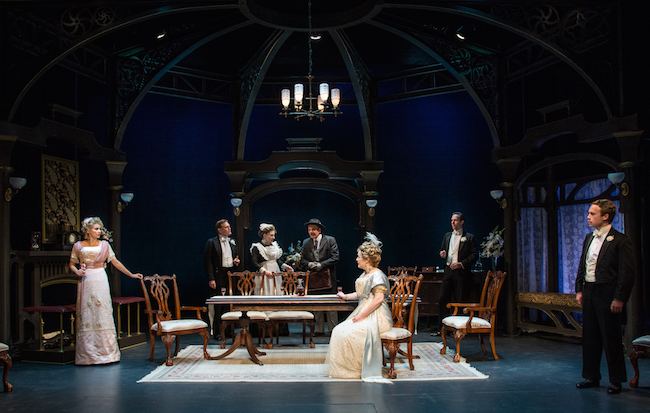Theater Review: “An Inspector Calls” — Sobering Morality Play
For all its Edwardian setting and its mid-twentieth-century no-exit philosophy, An Inspector Calls speaks with ease to our own times, bedeviled with “alternate facts” and ethical doubts.
An Inspector Calls by J. B. Priestly. Directed by Keith Stevens. Staged by the Peterborough Players at 55 Hadley Road, Peterborough, New Hampshire, through July 29.

A scene from the Peterborough Players production of “An Inspector Calls.” L to R: Rebecca Brinkley, Jack Koenig, Anna Rock, Gus Kaikkonen, Dee Nelson, Marc LeVasseur, and Alex Carr. Photo: Will Howell.
By Jim Kates
By chance, on the day I saw An Inspector Calls, I had just finished reading a book about moral responsibility and the concept known in tort law as “proximate cause.” When an event occurs, how do we determine which other events in the chain that lead up to it actually “caused” it, and whom do we hold responsible for the outcome?
This is the very argument that J. B. Priestley’s morality play dramatizes. For a premise that might sound heavy, the action on stage is swift, comprehensible, and entertaining. If it moves forward at times with the predictability and inexorability of Oedipus, it ultimately turns on a twist so unexpected that a reviewer has difficulty writing coherently about the play without spoiling the whole thing.
Let me go as far as to say that at a critical moment in the last act, one of the main characters spells out the inspector’s name into a telephone, and an attentive theatergoer will wonder, “How did he know how the name is spelled?”
An Inspector Calls unfolds as a dining-room period piece (written in the 1940s, it is set back in 1912) populated by a complacent Edwardian clan that includes a successful industrialist father, Arthur Birling (Jack Koenig) his self-satisfied wife Sybil (Dee Nelson) their unstable son Eric (Alex Carr) their daughter Sheila (Rebecca Brinkley) and her eminently suitable fiancé Gerald Croft (Marc LaVasseur). Into their celebratory engagement-party dinner steps Inspector Goole (Gus Kaikkonen) who turns a carefully calibrated world upside down, drawing from each of them one confession after another.
The confessions take up two of the three concise acts. The third raises a question that has underlain the first two: who is this inspector Goole who has come calling?
And here, because I don’t want to give away too much of the plot, I have to write about his characters. Priestley’s depiction of character makes An Inspector Calls difficult to stage, because his figures have little personality outside the acts that define them — this, after all, is the main point of the play — and Inspector Goole has practically none at all.
“He speaks carefully, weightily, and has a disconcerting habit of looking hard at the person he addresses before actually speaking,” the stage direction reads at Goole’s introduction, and this defines the role from beginning to end. Kaikkonen’s Goole speaks carefully, weightily, but his timing is slightly off, so that his hard looks come across most often as perfunctory rather than soul-searching, his pauses and stalking the stage Columbo-like gimmicks rather than suited to the moment.
Director Keith Stevens might have paid more attention to the rhythms of timing and reactions to what has just been said. Too often the cast members seem to be saying their lines rather than speaking to each other, and a metronomic regularity creeps in. It may be one effect of this that the latent funniness of some of their words and situations gets played up more than the tension of the scenes they’re embedded in. This lightens the pace and relieves the audience, but at the production’s dramatic expense.
The staging’s direction and acting are not helped by the script’s stereotypicality of the written roles. Nelson transcends her matronly expectations best, so we feel that her self-justifications, the room she takes up in the world, are internally generated, and not dictated by lines. Brinkley, as her daughter Sheila, comes off as the most complex character in the play. The figure demonstrates an opportunity for learning and growth that Brinkley carries off, amplifying the play’s moral focus. Her wailing “How was I to know what would happen afterwards?” is heartfelt and resonant.
LaVasseur’s Gerald Croft — the potential son-in-law — moves in and out of our sympathy with a slipperiness that leaves little chance for us to take in his own shifting ethics.
By contrast, Koenig’s Arthur Birling exhibits little beyond bluster and attitude. This is certainly consistent with the play as written, but means that his performance has little individual flair. And Carr plays Eric’s dissipation in comic-book disarray.
For all its Edwardian setting and its mid-twentieth-century no-exit philosophy, An Inspector Calls speaks with ease to our own times, bedeviled with “alternate facts” and ethical doubts. Like the Players’ previous production of The Skin of Our Teeth, its relevance reverberates.
Jim Kates is a poet, feature journalist and reviewer, literary translator and the president and co-director of Zephyr Press, a non-profit press that focuses on contemporary works in translation from Russia, Eastern Europe, and Asia. His latest book is Muddy River (Carcanet), a translation of verse by Russian existentialist Sergey Stratanovsky. His translation of Mikhail Yeryomin: Selected Poems 1957-2009 (White Pine Press) won the second Cliff Becker Prize in Translation.
